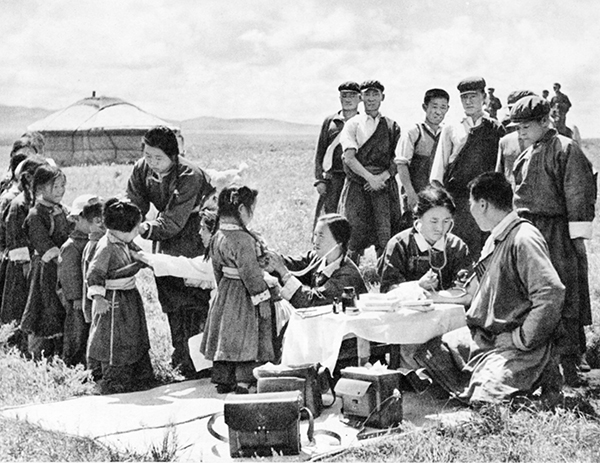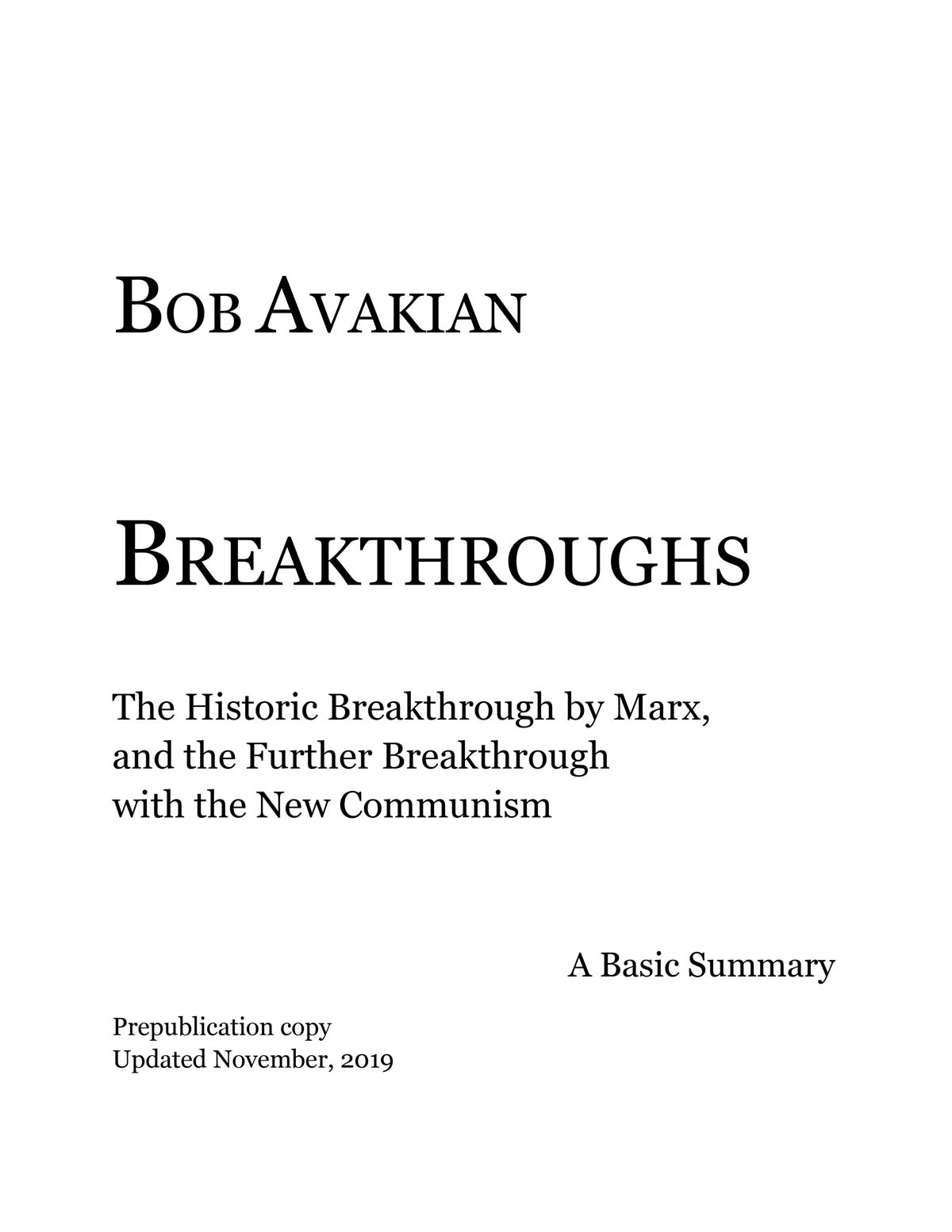A health crisis like COVID-19 in a genuinely socialist society:
The Needs of Humanity First, Not the Drive to Profit and Capital Accumulation
| revcom.us
Letter from a reader:
The coronavirus pandemic is a natural (biological) phenomenon, a highly transmissible and deadly virus. But how this virus is being dealt with is shaped and governed by the system we live under and that rules the world right now: capitalism-imperialism. It is organized around profit, not the well-being of humanity. And it has been an abysmal and horrific failure...
No real prior preparedness. Chronic inability to coordinate a rapid-emergency response. You see it in the lines outside hospitals... in shortages of protective masks... in press conferences with Trump... official pronouncements that fly in the face of evidence-based science. Utterly unnecessary suffering, dislocation, and misdirection. BUT IT DOESN’T HAVE TO BE THIS WAY!
I was reflecting on the experience of a previous socialist revolution... and at how a society based on the new communism developed by Bob Avakian could and would address an emergency like coronavirus. Here are some initial thoughts, and I encourage people to read both about the previous socialist experience and the Constitution for the New Socialist Republic in North America, a concrete and sweeping vision of a genuinely socialist society authored by Bob Avakian.
Public Health in Revolutionary China, 1949-76
China in the years 1949-76 was a genuine socialist society (not the capitalist system it is today). In 1949, a revolution of hundreds of millions of people led by Mao Zedong overthrew the old, oppressive order. A society in which an estimated four million people died each year of infectious and preventable diseases, where 1 in 5 children died by age one.
The socialist revolution made public health a priority. Hospitals, clinics, and other facilities were quickly constructed—and health personnel trained. The principle “serve the people” guided medical work. The work of health professionals was combined with educating, involving, and mobilizing people at the grass roots. Communities throughout society had responsibility in health and disease-prevention campaigns, emergencies, and coping with natural disasters.
In just 15 years, between 1950 and 1965, revolutionary China wiped out most infectious diseases like cholera, smallpox, and major nutrition-related illnesses: an accomplishment unprecedented in scale and rapidity in the history of the world.
The Cultural Revolution of 1966-76 forged the most egalitarian, needs-based health care system in the world. A “barefoot doctor” movement trained some one million young educated peasants and urban students to provide basic medical services and education in rural villages. Medical and scientific knowledge was spread—no longer the property of the few. Life expectancy in China rose from 32 years in 1949 to 65 years in 1976.
How a Society Based on the Constitution of the New Socialist Republic in North America Would Handle a Health Crisis
In order to bring this new socialist republic into being, it would be necessary—through an actual revolution involving millions and millions of people when the time is right—to “thoroughly defeat, dismantle and abolish the capitalist-imperialist state of the USA,” bringing into being a thoroughly different state power, economy, and society. The preparedness, response and overall approach to a crisis like COVID-19 would be radically different in socialist society, and would include, among other dimensions:
1) Health and Disaster Preparation
A socialist economy and society would have a much more conscious and planned approach, including in its interaction with the environment. How we live on an endangered planet would be part of long-term planning—for instance, potentially scaling back the density of cities. There would be planning for climate-related catastrophes, as well as health emergencies: ongoing research into these dangers, potential outcomes, vaccines, and cures; factories fitted for multipurpose use that can be re-oriented to manufacture critically needed supplies in the case of emergency; public education, especially and including in science and a scientific method; and reserves earmarked for anticipated problems and crises—like ventilators, medicines, and antibiotics, and food and material supplies.
But unexpected things will happen and resources are limited. So there needs to be ongoing societal discussion and education—with views of experts, and planning priorities, broadly discussed and debated in society, not just dictated by the needs of capital or the conscious policies of oppressive ruling classes, as happens in this system.
2) An Economy That Serves the Needs of Humanity, a Society That Unleashes People and Their Creativity, a State That Gives This Backing
A socialist economy is not constrained by profit accumulation and the barriers of private ownership. The socialist state would develop and utilize economic resources and technology for the needs and betterment of humanity. It would be geared toward overcoming the great divisions of society and the world; protecting the environment; and promoting revolution around the world.
In a crisis like the one we’re facing, society would be working to meet the food-nutritional and safe-shelter needs of people, with priority to those most in need. Health care professionals would be mobilized; new medical facilities quickly built; and resources allocated and cooperative, coordinated crash efforts organized to develop necessary treatments and vaccines, where needed.
The most vital resource—people and their creativity—would be unleashed. You need to solve pressing problems: checking up on people’s well-being (especially the most vulnerable); communicating information and developing emergency distribution systems (safely); figuring out how to conduct essential production and other activities without endangering health.
All of this potential of people from different walks of life, with different skills and knowledge and experience —who could be contributing and problem-solving and learning from each other in all kinds of ways—is constrained and ultimately squandered in this society. What sometimes happens spontaneously in crises—people putting aside individual concerns to help each other—would be promoted and amplified in a society based on cooperation.
The socialist state power would give this “backing” or support, as part of facilitating and leading the nationwide coordinated and planned response to such an epidemic—a far cry and contrast with what we witness today with the fascist Trump-Pence regime
3) The whole world comes first
The new socialist society would aim to collaborate with medical and research institutions, health agencies, and others throughout the world: to share knowledge and data; to strive to make emergency breakthroughs in treatment and vaccination. It would not be operating with privatized patents and commercial rights. It would be ready to send medical and fact-finding teams to where they are most needed. As a general and overall principle, it would welcome immigrants and refugees seeking to be part of and contribute to the new society—instead of locking immigrants up in disease-infested hellholes.
4) Emergencies, dissent, and the new communism
In a pandemic like this, the socialist state will issue emergency decrees and directives to coordinate emergency mobilizations. This is a good and necessary thing. There will be ideological struggle over putting the public first (not hoarding supplies, etc.). It will be necessary to assign doctors, construction workers, and others to go to areas and take up work where needed—with calls put out for volunteers to step forward. People can work and “pull together” in ways unimaginable today, in this society and system.
But differences and disagreements will emerge, including, potentially, protests. Short-term necessity will require massive adjustments. Some people will be agonizing over policy and the direction of society. And as Bob Avakian emphasizes in his writings and talks, ferment and dissent are essential to the fabric of the new socialist society, including in dire circumstances—to the process of both getting to the truth, and to advancing toward a world free of exploitation, oppression, and antagonistic social divides.
The means to deal with these emergencies must be consistent with the goal of a society and world in which there is no oppression and exploitation, in which people are ever-more consciously and voluntarily changing society and themselves. As Bob Avakian himself has emphasized:
the new communism thoroughly repudiates and is determined to root out of the communist movement the poisonous notion, and practice, that “the ends justifies the means.” It is a bedrock principle of the new communism that the “means” of this movement must flow from and be consistent with the fundamental “ends” of abolishing all exploitation and oppression through revolution led on a scientific basis. (From Breakthroughs: The Historic Breakthrough by Marx, and the Further Breakthrough with the New Communism, A Basic Summary)

The principle “serve the people” guided medical work in revolutionary China, 1949-76. A “barefoot doctor” movement trained young educated peasants and urban students to provide basic medical services and education, as seen here: barefoot doctors in Inner Mongolia.
Get a free email subscription to revcom.us:



